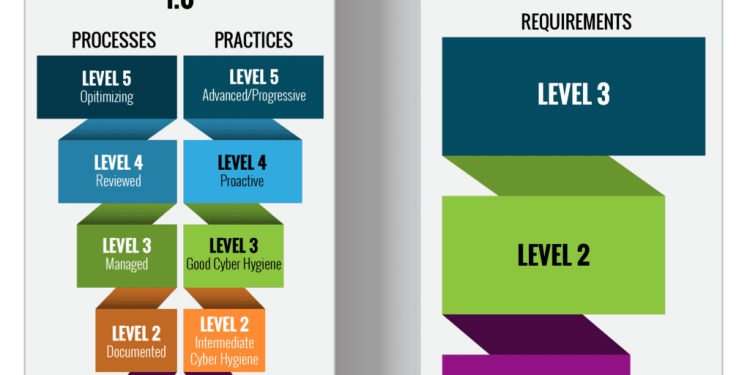The Cybersecurity Maturity Model Certification (CMMC) has become a crucial requirement for contractors and organizations working with the Department of Defense (DoD). With sensitive data such as Controlled Unclassified Information (CUI) and Federal Contract Information (FCI) being handled across a wide range of entities, ensuring the protection of this data is essential. The CMMC framework establishes cybersecurity standards that contractors must meet to participate in DoD contracts, making cyber hygiene a fundamental part of achieving and maintaining CMMC compliance.
Cyber hygiene refers to the routine practices and measures that organizations implement to ensure the security of their networks and data. These basic cybersecurity habits are critical for building a solid foundation upon which more advanced security measures can be built. Without strong cyber hygiene practices, organizations may struggle to meet the CMMC requirements and face vulnerabilities that could lead to costly breaches or even the loss of contracts.
Understanding the Role of Cyber Hygiene in CMMC Compliance
At the heart of CMMC compliance is the requirement to demonstrate that an organization has implemented adequate cybersecurity measures to protect sensitive information. Cyber hygiene plays a key role in this, particularly at the lower CMMC levels, where basic cybersecurity hygiene forms the foundation of certification. For organizations seeking certification at CMMC Level 1, for example, the focus is on essential practices that safeguard information from unauthorized access.
CMMC Level 1 primarily involves implementing fundamental cybersecurity practices such as password protection, access control, and secure system configurations. These practices fall under the umbrella of cyber hygiene, helping organizations address the most common security vulnerabilities. By adhering to these basic practices, contractors can ensure that they are laying the groundwork for more advanced protections required at higher CMMC levels.
For organizations aiming to achieve CMMC Level 2 or Level 3 certification, cyber hygiene remains critical. While the higher levels require more sophisticated cybersecurity measures, maintaining basic hygiene ensures that foundational security principles are in place, minimizing the likelihood of breaches due to simple oversights. A CMMC consultant can help organizations assess their current cyber hygiene practices and identify areas that need improvement to meet CMMC requirements.
Key Elements of Cyber Hygiene for CMMC Certification
Achieving and maintaining strong cyber hygiene involves adhering to several key practices that ensure the ongoing security of systems and data. Organizations working toward CMMC certification should focus on the following elements:
- Password management: One of the simplest yet most important aspects of cyber hygiene is ensuring that strong passwords are used across all systems. Employees should be required to use complex passwords that are regularly updated, and multi-factor authentication should be implemented where possible. This practice helps protect against unauthorized access, which is a key requirement of CMMC cybersecurity standards.
- Access control: Limiting access to sensitive information based on job roles is an essential part of cyber hygiene. Organizations must ensure that only authorized individuals have access to CUI or FCI, reducing the risk of insider threats or accidental exposure. Access control measures such as role-based permissions and user authentication are necessary for meeting CMMC requirements.
- System updates and patch management: Regularly updating software and systems to address known vulnerabilities is another fundamental element of cyber hygiene. Unpatched systems can be easily exploited by attackers, making it essential for organizations to keep their technology up to date. CMMC compliance requires that organizations have processes in place for managing and applying patches to their systems.
- Backup and data recovery: Having a robust backup and data recovery plan is essential for ensuring business continuity in the event of a cyber incident. Organizations must regularly back up their critical data and ensure that they can quickly recover it in the event of a ransomware attack or system failure. This practice is an important aspect of both cyber hygiene and CMMC compliance.
- Security awareness training: Ensuring that employees are aware of cybersecurity best practices is a critical part of maintaining strong cyber hygiene. Regular training sessions should cover topics such as phishing detection, safe internet usage, and the importance of protecting sensitive data. Organizations working with a CMMC consultant can develop customized training programs that address the specific risks their employees may face.
A well-rounded cyber hygiene program addresses these key areas, providing the foundation needed to achieve CMMC compliance at any level. By implementing these practices, contractors can minimize their risk of security incidents and strengthen their overall cybersecurity posture.
How Cyber Hygiene Supports CMMC Assessments
Cyber hygiene plays a significant role in helping organizations prepare for their formal CMMC assessment. When assessors review an organization’s cybersecurity practices, they will evaluate whether basic hygiene measures are in place and functioning as intended. For example, CMMC assessors will look for evidence that the organization has implemented password policies, restricted access to sensitive data, and regularly updated its systems.
If an organization lacks proper cyber hygiene, it risks failing its CMMC assessment and potentially losing out on valuable DoD contracts. Strong hygiene practices reduce the risk of cybersecurity lapses and help demonstrate to assessors that the organization takes its security responsibilities seriously. Regularly reviewing and updating these practices ensures that they remain effective and aligned with CMMC requirements.
Working with a CMMC consultant can help organizations identify any gaps in their cyber hygiene and develop a plan for addressing them before the formal CMMC assessment. A consultant can guide organizations through the process of preparing documentation, implementing controls, and conducting internal audits to ensure that all necessary cybersecurity measures are in place.
Benefits of Strong Cyber Hygiene in Achieving CMMC Certification
Maintaining strong cyber hygiene offers several key benefits for organizations seeking CMMC certification. These benefits go beyond simply meeting the certification requirements and contribute to a more secure and resilient business environment:
- Reduced risk of breaches: By following basic cybersecurity best practices, organizations can significantly reduce their risk of data breaches and other cyber incidents. Strong cyber hygiene helps close the most common vulnerabilities, making it more difficult for attackers to gain access to sensitive systems and data.
- Improved readiness for higher CMMC levels: Organizations that prioritize cyber hygiene at the lower CMMC levels are better prepared to implement more advanced cybersecurity controls when pursuing higher levels of certification. By establishing a solid foundation, these organizations can build upon their existing security practices more easily.
- Better compliance with CMMC requirements: Implementing cyber hygiene practices directly addresses many of the CMMC requirements, particularly those related to access control, system security, and incident response. Ensuring that these basic practices are in place simplifies the process of achieving and maintaining CMMC compliance.
- Increased trust with the DoD: Organizations that demonstrate strong cybersecurity hygiene build greater trust with the DoD and other partners. This trust can translate into more opportunities for contracts and collaborations, as organizations that prioritize cybersecurity are seen as more reliable and secure.
For organizations working toward CMMC certification, cyber hygiene is not just a checkbox to complete but a critical component of their overall cybersecurity strategy. By focusing on basic cybersecurity best practices, contractors can position themselves for success in both their CMMC assessment and their long-term security efforts.
















